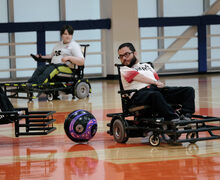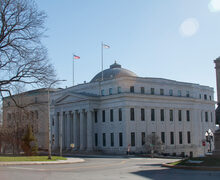Study to examine sustainable transportation in Syracuse, central New York
Sam Ogozalek | Staff Writer
Tarek Rakha said strengthening local car and bike share programs, such as the one recently launched by the Syracuse University student association, would positively impact the SU campus.
A team of researchers at Syracuse University is exploring a new way to make transportation in the city of Syracuse and central New York more environmentally friendly.
A year-long study called “Feasibility Assessment of Sustainable Transportation (FAST): Syracuse” — led by SU School of Architecture Assistant Professor Tarek Rakha — said he hopes to improve the transportation system within Syracuse and find alternatives to make it more carpool friendly, improve public transportation infrastructure and integrate more bike lanes and walking paths in the city.
Edward Bogucz, the executive director of the SU Center of Excellence, said the study is happening at an ideal time. After all the recent investments by Syracuse in more environmentally friendly groundwork, including the Syracuse Connective Corridor connecting the SU campus to downtown, it seems that the city is “poised to do something new,” he said.
The grant for FAST was garnered from two government agencies: the New York State Energy Research and Development Authority and the New York State Department of Transportation. The application for the grant was submitted on July 29 last year and the Center of Excellence was informed of receiving the award in December, Bogucz said.
FAST is divided into multiple parts. The first part, which has already been completed, was an assessment of current statistics, existing infrastructure and previous studies. A survey was administered to understand how people in the Syracuse community felt about the proposal and is still open to the public, Rakha said. More than 300 people have responded so far, and the team said it hopes to continue conducting research with focus groups.
In October, the team will start the programming portion of the study, focusing on human powered mobility, public transit and the sharing economy — specifically car sharing and bike sharing. Next year, the plan is to have rigorous exercises to find alternative sources of energy and transportation, Rakha said.
One of the programs involved in the study is called Clean Cities, an outreach program organized by the U.S. Department of Energy. The progress of Clean Cities programs is measured by how much petroleum each location displaces either through alternative energy sources or by a reduction in vehicle miles traveled.
Barry Carr, coordinator of the Clean Cities program of Central New York, said by securing another grant, Clean Cities was able to help the Centro Transit Hub’s buses run on natural gas rather than diesel. Some of the grant money was also used to develop an all-electric bus in California.
“The U.S. DOE Clean Cities program, along with the State of New York are providing incentives to install additional electric vehicle charging stations throughout central New York,” Carr said in an email. “These stations will provide opportunity charging for both plug-in hybrids and Battery Electric vehicles, an important part of sustainable transportation.”
Rakha said strengthening local car and bike share programs would positively impacts the SU campus.
Though the SU Student Association launched a bike share program on Monday, Carr, who is part of bike share programs in New York City and Washington D.C., envisions an expanded program in which kiosks are installed in downtown areas including Armory Square and the SU Center of Excellence.
Along with increased opportunity for bike use, Rakha said he hopes ride sharing services, including Lyft and Uber, will soon be allowed in central New York to reduce dependency on single occupancy vehicles.
Published on September 27, 2016 at 11:47 pm
Contact Sandhya: ssiyer@syr.edu




